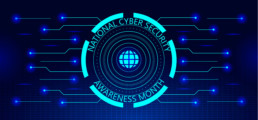Ransomware and More: 5 Common Cybercrimes in the Finance Industry
It seems a new type of cybercrime is arriving every day – but some types of cyberattacks stand out among the rest. This is especially true in the finance industry, which is filled with malicious actors looking to take advantage of confidential financial information. How can finance businesses deepen their safety measures like phishing scam protection?
To protect your organization from the negative effects of cyberattacks, like reputational harm, financial damage and legal battles, it’s imperative to know what cyberattacks to look out for. Let’s explore common forms of attacks below and how to recognize them before they affect your organization.
1. Ransomware
In 2022, ransomware was involved in 25% of all security breaches. It’s safe to say that ransomware is a highly common cyberattack – and it’s here to stay. During this attack, cybercriminals will enter an organization’s system, encrypt all data and ask the affected party to pay for a decryption key to access the stolen data again. Some malicious actors will go a step further and threaten to release the data or release sensitive information about a company to encourage faster payment.
2. Phishing Scams
Phishing scams are another all-too-common scam that affects businesses of all sizes, including entities as large as Facebook, Google and Sony Pictures. Here, a cybercriminal will mask themselves as a trusted entity, tricking the victim into clicking a malicious link through email or other forms of communication. Once the victim clicks on the link, they can leave the system vulnerable to malware, ransomware or spyware.
3. Third-Party Vulnerabilities
Financial organizations may work with third parties to help improve their customer service, resolve company pain points, or even to try and improve their security efforts. However, they also leave themselves open to the risk of attack from these parties – particularly if those parties are not secure themselves.
4. Noncompliance
One threat not often considered is one which comes from noncompliance with the latest industry security standards. Here, cybercriminals will target organizations with out-of-date tech or security strategies, as these often leave the greatest vulnerabilities. As a result, it’s essential to keep up with the latest cybersecurity standards, like those provided by the National Institute of Standards and Technology.
5. Insider Threats
The biggest threat to your company could be right inside your organization itself with an insider threat. Employees are the most commonly cited insider threats, but they could also include outside consultants, board members or vendors – essentially, anyone with access to inside information about your company. They may attempt to sabotage the company’s security or even attempt to steal company secrets.
How We Can Help You Avoid These Attacks
Now that you know the most common cyberattacks to look out for, the question becomes how you can avoid becoming a victim of one. The goal is to find a security partner who offers true cybersecurity protection – and that’s something we can help with. Partner with an MSP like us that can help develop a perfect security strategy for your business. Contact us today to learn more about how our services can aid your business. We can’t wait to speak with you!
If you’d like to learn more about how we can help your business with security, check out additional blogs in our resources section.
Your IT Budget: 5 Steps to Breaking Down the Essentials
The benefits of creating an IT budget go far beyond simply helping you with cost savings. Doing so also aids your organization in identifying and developing your IT initiatives across your departments. With a better understanding of your goals and your budget, you can boost productivity, efficiency and communication across the board. The question is, how can you get started with your IT budget planning? It all starts with a few simple steps.
What Is IT Budgeting?
IT budgeting involves allocating funds to various IT systems, services and projects across all departments. Funds can be used for one-time expenses like towards a specific project or for reoccurring costs like hiring and staffing employees. Moreover, companies can create a full-scale annual budget or smaller-scale, one-time project.
Examples of what might be included in your IT budget include:
- Human Capital: Compensation, recruitment or contracted staff
- Hardware: Laptops, mobile phones or servers
- Software: CRM software, subscriptions, operating systems or upgrades
- Maintenance: Third-party maintenance, warranties or repairs
- Security: Anti-virus, anti-malware or anti-ransomware software
Of course, each company has unique IT needs and will therefore have different budget priorities, bringing us to our next step.
IT Budget Planning Best Practices
To determine your budget, you can implement the following best practices and tips.
1. Plan Out Your IT Budget Calendar
Knowing your deadlines of when expenses are due will help give you a more accurate view of what your budget looks like month-to-month or year-to-year. Moreover, it also helps give the necessary stakeholders a better idea of what expenses need to be accounted for.
2. Review Past Budgets
The best way to prepare for the future is to review the past. If applicable to your company, look at past budgets you set for IT to see what you previously allocated. This will help you justify your chosen budget numbers and provide more of a structure.
3. Strategize Your Spending
To go about strategic spending, consider your company’s overall goals and objectives with each department’s priorities. This will require discussion and, more often than not, negotiation among departmental leaders and stakeholders. However, being clear about expectations will help give everyone a better understanding of what they can prioritize with their own tech.
4. Leverage New Technology
Technology is always evolving, providing plenty of new opportunities to increase efficiencies and business growth. However, knowing which technologies could empower your company takes a bit of research and discussion across teams. Moreover, many companies make the mistake of shelling out for new equipment without considering factors like integration, deployment and management. If opting for new technology, ensure you can account for all of these.
5. Remain Flexible
Of course, as with any type of budgeting, unforeseen expenses do pop up. Make certain you leave yourself some breathing room in case this occurs, so you don’t find yourself having to overspend.
Start Budgeting Right Today
Creating an IT budget is an imperative part of determining your spending for your IT needs. It all starts with asking yourself the right questions – what are your priorities? How do they align with your company objectives? What opportunities are there for you with your technology and tech solutions?
Fortunately, a B2B IT partner can help you better understand what IT tech and solutions you need to focus on to help you better determine your budget. Contact us today to get started.
Breaking Down Your Options and Costs: Your Guide to Outsourcing IT
Outsourcing IT has become an integral part of managing a business by freeing up resources, cutting costs and snuffing out disasters. Small businesses often outsource IT to ensure that their networks and business systems remain protected and efficiently running. Offloading all or some IT tasks can allow a business to focus more on primary goals rather than the day-to-day management of running a robust IT infrastructure.
If outsourcing your IT sounds like it would benefit your business, then let’s take a deeper look into the different options that your IT partner can assist you with, as well as cost structures that can help fit your budget and needs.
4 Service Options that Your IT Partner Can Assist You With
An outsourced IT partner can help improve your IT strategy by:
- Monitoring and Managing Your Systems: IT partners help to monitor and manage your servers, networks, applications and any devices to ensure there are no issues. Any disruptions are addressed in a timely manner and fixed before they become a bigger issue.
- Backing Up and Implementing a Disaster Recovery Plan: In case a disaster has occurred, IT experts ensure that all your critical data is backed up and accessible so operations can continue as normal, and your data stays protected.
- Improving Telecommunications: Your outsourced IT team can handle communications between your staff via the telephone or other communication platforms to ensure all correspondence stays on track.
- Managing Your IT Infrastructure: IT partners can manage all aspects of your IT infrastructure, including your hardware, software and network resources.
- Monthly Subscription or À La Carte
- These services are typically offered either as a monthly subscription, or à la carte, depending on the needs and budget of your business.
- Monthly Subscription: You will pay a flat fee every month for all-inclusive services. Many companies prefer this option for the consistent costs, and it works well when it comes to budgeting.
- À La Carte: You will only pay for the services that you need. This can provide a business with more flexibility and freedom—and often comes at a lower price than having to pay for a monthly subscription.
In Conclusion
Managing your IT is never a simple task. Technological problems can occur, which can lead to downtime, delays in getting projects completed and a hit to your company’s reputation. . Outsourcing your IT can lead to increased productivity and free up allocated resources to help you focus more on running your business.
The key is finding the right business partner to help you with your needs and understand what you are looking for in an IT services provider. By partnering with MSPN, we can help implement and manage your IT strategy. Let us get to know you and your IT plans. Don’t wait—give us a call!
If you want to learn more about outsourcing IT and what it could mean for your business—check out additional blogs in our resources section.
3 Reasons to Partner with an MSP On Your Next Digital Clean-Up: The Benefits of IT Lifecycle Management and More
You don’t have to be an IT expert to perform a cursory digital clean-up on your personal devices. Deleting unnecessary files, applications and videos is easy to do and can make room for files and applications you actually use. But if you’re attempting IT lifecycle management, penetration testing or security vulnerability assessments, you’ll want to consult with a managed services provider.
What Is a Digital Clean-Up?
Most IT professionals agree on what a comprehensive digital clean-up should include. Tasks range from performing an inventory of your IT infrastructure to identifying tools needing an upgrade to running security scans. Let’s discuss three areas of your business integral to a digital clean-up that require professional IT support.
1. IT Lifecycle Management
If you’re looking to optimize your technology, IT lifecycle management is a good place to start. This strategic approach to tech takes into account the full span, or lifecycle, of technology — from purchase and implementation to decline and retirement.
Benefits of IT lifecycle management services
Outdated technology can lead to lags in production, slow connectivity and the dreaded downtime. That goes for hardware like laptops, servers and devices, and software like Microsoft Windows, macOS and antivirus. IT lifecycle management services can identify lapsed updates and root causes of poor performance that result in:
- Increased downtime
- Increased costs
- Underutilized resources
- Drops in staff productivity
- Increased compliance and security risks
How much could a few hours of downtime cost your business? One study from the Ponemon Institute found the average cost of just one minute of downtime can be as much as $9,000.
2. Cybersecurity Services
If you’re concerned about your cybersecurity risks, there are a variety of professional assessments that can give you a clear picture of your current stance. The truth is, what you don’t know can hurt you. And for businesses in industries like healthcare and finance with strict compliance requirements, routine security assessments are essential. These include:
- Dark Web Monitoring: This service scans thousands of websites and forums on the dark web for your confidential information. If something is found, you get a notification so you can take action.
- Security Vulnerability Assessments: These scans review your IT infrastructure for security weaknesses. Potential gaps are identified, ranked by level of risk and remediation tasks are recommended if necessary.
- Penetrating Testing: Also known as pen testing, this service simulates a cyberattack on your IT infrastructure. Performed by an experienced managed service provider, these tests are useful in uncovering potential vulnerabilities.
According to CSO from IDG, 60% of listings on the dark web could harm companies.
3. Backup and Disaster Recovery Strategies
Like most technology, backup and disaster recovery strategies aren’t one-and-done efforts. Business models evolve, employees come and go, and what worked last year may not necessarily work today. A digital clean-up should take into account:
- Testing plan and response procedures evaluation
- New or updated critical business assets and applications
- Recovery personnel updates
2 of 3 midsize businesses suffered a ransomware attack in the past 18 months, according to ConnectWise.
Most small to medium-sized businesses don’t have the time or the resources to conduct a thorough digital clean-up, and that’s okay. Partnering with a managed services provider, or MSP, can help with expert, cost-effective solutions to decrease downtime, strengthen cybersecurity and much more. If you’re interested in partnering with an MSP, reach out. We have the tech professionals to keep your business running at its best. Contact us today.
Take Advantage of a Digital Clean-Up this Spring
Many people see spring as a way to declutter, freshen up and give their living environment a clean slate. This is a good tactic to utilize when you want to consolidate, clean and get organized—especially when it comes to your tech. Putting a digital spin on spring cleaning is an essential task because it gives you the time to refresh and evaluate your IT infrastructure, which, in turn, can eliminate bad digital habits that can lead to recourse. Are you taking advantage of a digital clean-up?
Cluttered technology can have a negative impact on your network, which can lead to downtime. According to Forbes, 82 percent of companies have experienced unplanned downtime in the last three years? Is your business one of them? The reality is that wasted time can lead to wasted money. Having a healthy network is the backbone of your business, so it’s essential that your business technology is up-to-par and running smoothly. That’s why now is the perfect time to treat your business to a digital clean-up.
Get Your Digital Tech in Tip-Top Shape
Here’s five ways that you can easily clean up your business technology on your own.
1. Clean up your browser: Besides your passwords and favorite sites, your browser can also store tons of cookies. These are trackers that follow you from web page to web page and power the ads and content you see. Take the time to clear your cache, cookies and even internet history to speed up your browsing.
2. Delete old accounts you no longer use: When an employee leaves your company, what are you doing with those accounts? The more online accounts that your business has, the more at risk you are when hackers come knocking. With data breaches happening left and right, all your usernames and passwords are a hot commodity. Take the time to delete or deactivate accounts that are no longer applicable to your business. It could save your business to take a little extra time to do this.
3. Catalog your physical property: It’s easy to lose track of what you have and what needs to be retired. Keeping a physical log of your items can help you to declutter and assist you when you are in a digital clean-up mode. Keeping a catalogue of your hardware and technology equipment has tons of perks. It keeps you aware of when your equipment was purchased, when it needs maintenance and when it may need to be retired. Of course, when you partner with an IT company, they can help you track these things too.
4. Refresh your system: In addition to your web browser, you should also look into refreshing any software that needs an update. Updated software can improve performance, ensure compatibility, patch up any security issues and offer you the latest features.
5. Use a password manager: We all know the drill when it comes to passwords and usernames. Keeping track of them all is a headache and could leave your business vulnerable to an attack. Utilizing a password manager can help keep track of everything in one centralized location and give you peace of mind.
Do You Have What It Takes to Take on a Digital Transformation?
As human beings, we often rely on drawers, boxes, shelves and cupboards to bring order to our chaotic clutter. When it comes to our “digital” lives, you need to implement the same good habits and frequently stay on-top of our tech.
If you need help with your digital clean-up, we are the MSP you’re looking for. We offer services like backup and recovery, cybersecurity and more that can help you take the next step in not only deep cleaning your tech but taking on a digital transformation. Don’t hesitate—give us a call today.
Happy Employees = Happy Bottom Line: A Case for the Hybrid Workforce
2020’s Coronavirus disease outbreak forced business owners to quickly rethink a new kind of workforce model. And while some businesses have resumed 100% onsite activities since, most businesses are choosing a hybrid workforce. Why? Flexible work schedules are directly correlated to employee satisfaction and the bottom line.
Prudential’s Pulse of American Worker survey found that 42% of remote workers say if their current company discontinues remote work options, they will look for a job with a company that does.
The 9-5 days are gone
Employees today expect flexibility. Working while juggling the plethora of life’s obligations is tough, and the hybrid workforce model is making work/life balance possible. Modern pressures and responsibilities have evolved, and so should the traditional work schedule. Employees appreciate the ability to get work done when it’s convenient for them.
Employees put a premium on physical and mental health
If you can’t afford a state-of-art gym, organically stocked cafes or daily meditation sessions onsite, that’s okay. Hybrid work models give employees the flexibility (and control) to make their physical and mental health a priority. Consider this: One survey report from Owl labs found remote workers reported less stress, more focus and a better work-life balance in comparison to fully onsite workers.
The battle for control
Good employees know when and where they are most productive. Why not give them the control to make the most of a work schedule that best suits them? Outdated, command-and-control management methods don’t inspire employees to be their most productive. It’s time to embrace a smarter, more innovative approach that allows employees the autonomy to choose how and where they get business done.
Savings all around
Hybrid work models save everyone money. A Global Workplace Analytics study found that employers can save over $11,000 per year, per employee, as a result of less office space, increased productivity, reduced absenteeism and less turnover.
The same goes for employees: The study also estimated that employees can save between $2,500 and $4,000 per year thanks to reduced food and fuel costs, lower car insurance premiums and less car wear and tear.
Productivity
Hybrid work models can empower employees to achieve their highest levels of productivity and engagement. One study from the University of Chicago found that 30% of respondents surveyed reported they were more productive and engaged when from home.
Recruitment
A 2021 Accenture survey found that 83% of workers around the globe prefer a hybrid workforce model. When it comes to competing for talent in a tight market, options like a flexible work schedule are becoming the norm, not the exception.
Retention
It makes good business sense to hold on to your best and brightest. And industry studies show that productive employees with flexible work schedules tend to stay with their employer longer than those without a flexible work schedule.
Turnover
Employee turnover is incredibly costly. Take into account the drop in morale, the impact on your organization’s reputation, and the time and money spent recruiting and training new hires.
One Workhuman study in late 2022 found employee turnover cost to be 1.5 to 2 times the amount of the employee's salary.
Conclusion
Employees who can take advantage of hybrid work models are happier, more productive, less likely to resign, a little less stressed and a little bit richer. Meanwhile, businesses offering flexible work schedules are seeing increased engagement, talent retention and reduced overhead costs.
Let’s get started: Schedule an assessment.
Whether you’re interested in starting a new work model or you’re well into it and looking to make improvements, we can help. Our staff specializes in cloud-based solutions, productivity tools and other technologies to keep remote employees engaged, efficient and connected 24/7/365.
How a Hybrid Workplace Can Benefit Your Business and Employees
Businesses have re-thought the way they work by introducing the hybrid workplace model. This combination of working at home and in the office has given employees the ability to be flexible, while also increasing productivity. It has truly given employees the freedom to work from wherever they feel they can do their best work. Not only has hybrid work changed where we do our jobs, but it has also changed the demands and needs of the employees themselves.
Have you started to think about transitioning to a hybrid model? If you’re wondering how a hybrid work environment can benefit your business and employees, you’ve come to the right place. Here’s to re-thinking the way we work, with these awesome benefits of implementing a hybrid work environment:
Increased Productivity
There’s speculation that giving employees the ability to work from home might decrease productivity and cause downtime. You can scrap that thought because studies from Microsoft show that 82% of leaders indicated that their workers were as productive, if not more so when working from home. At home, employees can utilize their time better by avoiding commuting, idle chit chat or unnecessary distractions that they might come across when in the office. They can choose the best times to get their work done in an area that allows them to focus better. It’s proved that happier employees who are less stressed can produce better work.
Reduced Overhead Costs
A successful hybrid workplace model can help businesses cut down on costs that would normally add up if employees were in the office regularly. Costs are always a big consideration when it comes to structuring the workplace. Fortunately, by decreasing the amount of time (or employees) who come into the office, you can reduce your overhead costs by switching to a more affordable office workstation.
Expanded Talent Pool
Offering hybrid work can open your pool of talented employees that could work for you. As hybrid work becomes more and more popular, you’re going to find more people with experience looking to join your team. Don’t shy away from these opportunities because they could make all the difference for your business, employing the best of the best.
How We Can Help You Transition
Here at , we can help you make that transition to hybrid work. Whether you need a flexible office with reliable technology solutions, or you are looking to increase your cybersecurity solutions to better protect your data we have you covered. We love to empower your business so you can focus on doing what you do best. Let us handle your IT so you can work on making your employees shine. Don’t hesitate today— give us a call.
If you’d like to learn tips on how to better prepare your business for going hybrid, check out additional blogs in our resources section.
3 Ways You Can Grow Your Business in 2023
It All Starts with Buying New Tech for Your Business
In the past few years, businesses have undergone tremendous transformation in an effort to keep up with unprecedented world events and changes. All signs point to 2023 remaining just as filled with ever-evolving developments. Still, one thing is for sure — we’re bound to have opportunities for business growth and improvement. One unmissable opportunity is buying new tech for your business.
As the year ends, businesses must also gear up for tax season in order to have a financially smooth 2023. Luckily, there are end-of-the-year tax benefits that allow you to claim deductions on new tech purchases. It’s the ultimate holiday gift for your company and a great way to kick off the new year.
This blog will explore how you can prepare your business this holiday season for an even more successful year.
1. Buying New Tech for Your Business
Too many companies make the mistake of holding onto outdated technology until it dies before making new purchases. As a result, they deal with slow systems that often decrease productivity, efficiency and staff morale. Instead, businesses can take advantage of end-of-the year tax benefits like Section 179 to invest in new tech while saving big.
With Section 179, businesses can deduct the total purchase price of qualifying equipment or software purchased or financed in the tax year. This tax deduction was created to help ease tax burdens (particularly on small businesses) and encourage organizations to invest in new tech.
2. Staying Up to Date with Industry Trends
The new year will come with its own set of industry trends that you must keep on top of to remain competitive. Doing so is also a great way to ensure that your products and services are relevant to customers’ current demands.
You can keep up with trends, like digitization or automation, in several different ways. The first is to read up on trends through industry publications and websites, local and national newspapers or blogs from prominent thought leaders. Another idea is to attend conferences, trade shows or networking events where you can converse on the latest topics.
3. Addressing the Talent Challenge
One of the biggest shifts in the past few years has been how employees approach work life. Nowadays, many employees seek positions where factors like hybrid work are an option. In essence, they’re looking for a more adaptive company culture and greater flexibility overall.
As a result of these developing employee expectations, employers must re-evaluate what they can do to attract new talent. That may mean changing the company’s work structure, such as using cloud-based tools to support remote communication and collaboration. Ultimately, your business should seek out areas where you can provide new employees with an opportunity for growth and value in their careers.
Take the Next Step
2023 will arrive before we know it. There’s no doubt that with the new year will come many changes and a greater need to adapt your business to them. You can finish off 2022 by buying new tech for your business. Following that, you can look into new industry trends and reconsider how you can approach finding new talent.
Consult our IT experts if you’d like guidance on how you can leverage your tech to bring out the best in your business. You can also consult with a tax professional to learn how Section 179 applies to your business.
If you’d like to learn about other IT tools and strategies, check out additional blogs in our resources section.
Technology Tax Deductions: Why It's Time...
For some small to mid-sized businesses, it may seem easier to hold onto technology until the device stops working. However, in today’s tech-driven world, keeping up with new technological demands is more important than ever. Otherwise, businesses risk falling behind their competitors and slowing down their operations. Luckily, the U.S. government has provided an incentive for businesses to grow with their tech thanks to technology tax deductions.
Using the technology tax deduction Section 179, businesses can write off their full purchase of new equipment at the end of the tax year, which in turn can decrease their tax burden.
Let’s explore everything you need to know about why and how you should upgrade your technology.
1. Enjoy Better Efficiency
Devices that run on slow systems cause numerous problems, including delays or glitches. These issues lead to downtime, which can be costly for a company and lead to possible reputational damage on behalf of customers.
Instead, with modern tech, your business can enjoy much more efficient, smoother, streamlined operations that keep your staff and customers happy. Moreover, new technology comes with better features that can help automate administrative processes so you can focus on the bigger picture.
2. Strengthen Your Cybersecurity
88% of small business owners feel their business is vulnerable to a cyberattack. It’s understandable why — cyberattacks are only getting more complex as hackers develop new ways to infiltrate businesses. Old technology is more vulnerable to hacks, security breaches and leaks, as outdated software can’t successfully hold up against an attack.
By upgrading your equipment, you develop stronger cybersecurity that’s more equipped to fend off hackers. Plus, cybersecurity measures are always evolving to keep up with new cybercrimes. Following the most cutting-edge security practices can strengthen your safety online.
3. Save Costs and Grow
Many companies are wary of investing in new equipment for fear of high costs and risking their competitive edge. Fortunately, with technology tax deductions like Section 179, businesses can more confidently invest in technology and allow their company to flourish.
The Section 179 tax deduction allows businesses to deduct the full purchase price of qualifying equipment or software bought, financed or leased during the tax year from their gross income. There’s no more waiting to write off for depreciation. As long as the qualifying equipment was bought and used from January 1st to December 31st of the tax year and used over 50% of the time for business purposes, businesses can write it off.
Here’s what equipment qualifies:
- Workstations, laptops, tablets or smartphones
- Servers, printers, routers and network security appliances
- Off-the-shelf software
Invest in Yourself
The time to invest in new technology for your business is now. Luckily, thanks to technology tax deductions, your business can reduce expenses while taking advantage of the latest and greatest in hardware and software.
You can contact our IT experts to ensure you don’t miss out on savings and leverage the best equipment out there.
If you want to learn more about cost-saving IT resources and strategies, check out additional blogs in our resources section.
The information provided in this blog is for educational purposes only. Consult your tax professional for information on how Section 179 may relate to your business.
Cybersecurity Awareness Month 2022—Common Phishing Attacks Your Business Could Face
Did you know that cybercriminals are getting more sophisticated each day with the attacks that they perform? How do you strive to improve your cybersecurity and bring awareness to your staff? Cybersecurity Awareness Month 2022 helps to promote vital cybersecurity information throughout the month of October. Companies can utilize this information to help clients, leadership and even staff to learn more about cybercriminals and the threats that they can cause.
Besides focusing on behaviors that are important for your business to follow—like common practices and tips to keep you safe online—you can also familiarize yourself with common cyberattacks that your business might face.
The 6 Most Common Phishing Attacks
Many individuals worldwide continue to fall for phishing attacks because cyberthreats are really improving at disguising these clever attacks. In fact, it was reported that over 90% of data breaches occur on account of phishing attacks. All attacks start the same: a cybercriminal attempts to get the end-user to share sensitive data or click on suspicious links. Once the victim clicks on or downloads the attachment, the cyberthreat can then install malicious software on your computer.
Here are some of the most common types of phishing scams that you and your employees should be on the lookout for:
- Spoofing: When criminals disguise themselves as a trusted source to gain a victim’s confidence to get access to sensitive information.
- Spear Phishing: A method that targets specific individuals or groups within an organization to get a victim to divulge important information.
- Whaling: Also known as CEO fraud, this type of attack impersonates a CEO and is designed to encourage an employee to perform a secondary act. These acts can include transferring money, buying gift cards and so forth.
- Vishing: A cybercrime that occurs when criminals trick people into giving confidential information through deceptive phone calls.
- Smishing: When criminals utilize SMS to send a compelling text to trick targeted recipients into clicking suspicious links.
- Malvertising: An attack in which perpetrators embed codes into online advertising that redirects victims to malicious websites.
To avoid falling for a phishing attack, look for signs that might seem off. Avoid giving sensitive information over the phone and be leery of requests that don’t seem right. When viewing emails—typically—a generic greeting that doesn’t use your name or a URL that doesn’t start with “http” can be a sign not to click. When in doubt, if it looks suspicious or seems off, don’t click.
What We Can Do to Help
Data breaches can be damaging enough, and who knows where your personal or client information could end up. Successfully defending your business against cyberattacks is something to think about when your business is at risk. As Cybersecurity Awareness Month 2022 is in full swing, help learn how to better prepare your staff to get the awareness you need.
When you’re looking for a partner to help fight against cyberattacks and bring more cybersecurity awareness and training to your staff — contact us. At Sentry IT, we are well-versed in innovative techniques that can help prepare for the unexpected.
If you want to learn more about cybersecurity awareness, check out additional blogs in our resources section.










